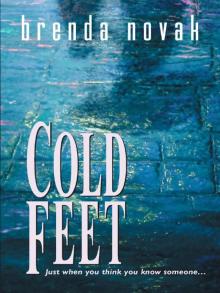- Home
- Brenda Novak
Stop Me Page 4
Stop Me Read online
Page 4
After her stint in the hospital, Jasmine couldn’t picture her sister’s kidnapper anymore. He’d become an out-of-focus face with a beard. That was all. And the drugs she took in her late teens made the image even fuzzier. She’d thought she’d lost those details—until three days ago, when she’d seen him in her mind’s eye.
“I have company for the holidays,” Ms. Gulley said, “but I’d be happy to set up an appointment with you for after they leave.”
The holidays. Jasmine felt none of the festivity or excitement. Christmas had become an irritant to her, an obstacle that made what she was trying to accomplish more difficult. “When will that be?” she asked, unable to conceal her disappointment.
“Tuesday?”
That was a whole week away! “Is there anyone else in the area who could help me sooner?”
“Frank West might be available. He just moved here, but he’s done a lot of work for various police departments in Tennessee.”
She spoke politely, but Jasmine sensed an underlying vein of annoyance. Ms. Gulley felt she had the right to enjoy Christmas without interruption, and she did—but Jasmine couldn’t sit and do nothing until the world was ready to turn again. “Is he any good?”
“I’m better. Especially if you want age progression. That requires a certain knack.”
Jasmine wished she didn’t believe Ms. Gulley’s frank appraisal of her own ability, but the woman’s confident manner and decades of experience had convinced her. Torn and impatient, she hesitated, but ultimately conceded. “Fine. Where’s your office?”
“I work out of my house. In Kenner. Where are you staying?”
“The Quarter.”
“I’m about fifteen miles away. Do you have a car?”
“Not yet, but I can get one.”
“Shall we say two o’clock?”
Jasmine swallowed a sigh. “That’s fine. I’ll see you after Christmas.”
“Ms. Stratford?”
“Yes?”
“Don’t let this get the best of you,” she said and hung up.
Jasmine sat in her small chair at her small desk in her small room and slowly set the phone in its cradle. Ms. Gulley’s advice came far too late. The abduction had gotten the best of her sixteen years ago. She’d lived beneath the crushing weight of it ever since.
Suddenly yearning for the Christmases that once were, before Kimberly was taken, she picked up the phone and dialed her father. These days he lived with a woman and her two kids whom she’d met only once in Mobile, Alabama, which wasn’t far from New Orleans. But imagining how the call might go—the stiff formal reception, the underlying current that led her to believe her father would rather not hear from her, even during the holidays—she hung up before it could ring. Then she went to the library.
* * *
The New Orleans Public Library, located only a mile from Maison du Soleil, was too quiet. Like the call to Rayne Gulley, it reminded Jasmine that it was Christmastime and everyone else was out shopping, trimming trees, baking, celebrating. But at least the solitude meant she probably wouldn’t be interrupted.
She sat on the third floor in the microfilm section, with only the male librarian at the desk for company, poring over past issues of the Times Picayune, New Orleans’ biggest paper. She was searching for anything that stood out or brought to mind the man who’d taken Kimberly. Mr. Cabanis didn’t recall hearing about any stranger abductions since the Fornier case, but that didn’t mean there hadn’t been any. Hurricane Katrina had dominated the news for so long, a case involving a young girl or early teen found murdered could have turned into one more statistic, especially if there were no leads in the case, no parents screaming for action. If the man with the beard had begun targeting easier victims, victims whose absence wasn’t so quickly noticed, he could be here, indulging his sick impulses just as his note suggested.
But Jasmine had already put in six hours and had yet to spot anything remotely useful.
Leaning back, she pressed her palms to her eyes to give them a much-needed rest. Her back ached and she was hungry. All she’d eaten for breakfast was a muffin, which she’d purchased on the walk from her hotel. But the library closed in another fifty minutes. She figured she might as well make good use of the remaining time. If she was careful, and lucky, she could come across something important, something that might seem at first glance to be unrelated but would make sense to her.
After stretching her neck and rolling her shoulders, Jasmine returned to the microfilm. She’d worked her way back to September 2005. Because that was immediately after the hurricane, the headlines resurrected the horror the entire nation had felt at seeing people stranded on rooftops or swimming for their lives. Jasmine doubted she’d find anything related to her search here—one child who’d mysteriously disappeared wasn’t going to make the news when thousands were dying—and began to skim faster: another day, week, month, year.
When she reached October 2004, the name she’d heard from Mr. Cabanis just that morning jumped out at her: Romain Fornier.
The article, which reported on Mr. Fornier’s sentencing, showed a picture of him. Somewhere in his early thirties, he had light-colored hair that fell across his forehead as if he’d forgotten about regular haircuts—which he probably had—high cheekbones that made the contours of his face more pronounced, a slight cleft at the chin. He wasn’t unhandsome. As a matter of fact, he would’ve been gorgeous, except for the furrow between his eyebrows, the determined set to his mouth and the stormy expression in his eyes.
Jasmine stared at him for several seconds. She could identify with the rage he carried in every line of his face….
In another section of the same paper, she saw a few letters to the editor. Some condemned what he’d done; others applauded. A Lee James said Moreau got what he deserved, that any father would do the same and rightfully so. A “Concerned Citizen” maintained that society cannot foster vigilantism, even in such a heartbreaking case.
What if victims took the law into their own hands and killed the wrong person? We can’t allow any tolerance for this kind of behavior regardless of the situation. We have laws, which must be upheld.
Jasmine didn’t want to consider the issue. She felt too sympathetic to Romain Fornier, although she understood the dangers, both legal and moral, involved in what he’d done.
Skipping farther back, she saw an article that gave more information on the shooting, which had occurred pretty much as Mr. Cabanis had described. As they were leaving the courthouse, Fornier had grabbed a gun from the hip holster of an accompanying detective—Alvin Huff. Fornier fired, then immediately dropped the gun.
From there, it was easy to find information on Fornier because the trial had been covered so extensively. The case made the front-page headlines the day it was dismissed. There was another picture with that article, this one in color, showing Fornier from the waist up.
A muscular, rugged-looking man dressed in a denim shirt, he had a golden tan and streaky blond hair. Although the accompanying article lacked some details Jasmine would’ve liked, it mentioned Alvin Huff as the detective who’d headed up the investigation into Fornier’s daughter’s disappearance and explained the reason the case had been dismissed. Apparently, an informant called Detective Huff late one night to say she saw Moreau, who was already a suspect because he’d been spotted at Adele’s school, carry something wrapped in a blanket into his house the night Adele was kidnapped. Understandably, Huff moved to get a search warrant as fast as possible. He called the judge and obtained verbal permission, but he had to wait until morning before he could get the affidavit signed and he didn’t do that.
Afraid the suspect would destroy any evidence that remained, Huff performed the search and, instead of leaving a copy of the warrant on the premises as he was supposed to do, he dropped it by later that morning. The suspect didn’t know there was anything wrong with the late receipt so it went unnoticed until his mother brought up the fact that the detective had returned to the hou
se. Then the defense team demanded the evidence collected from the illegal search be thrown out, the prosecution didn’t have a strong enough case without it, and the judge was forced to dismiss.
There was also an article the day following the discovery of Adele’s body. The child was discovered by a picnicker nearly four weeks after her abduction. Prior to that article, there were several others that chronicled the search. In the earliest mention of Fornier, Jasmine learned he was originally from a town called Mamou, which she assumed was in Louisiana because the journalist didn’t specify another state. She also learned that he’d been a Reconnaissance Marine, and that he’d moved to New Orleans after being released from the military; he’d opened a custom motorcycle business where he built high-end machines by hand. As if his story wasn’t sad enough, he was a widower. He’d lost his wife, Pamela, to breast cancer only two years before his daughter went missing.
Considering Fornier’s extensive military training, Moreau was stupid to provoke him. But he probably hadn’t understood what kind of man he was dealing with. Sexual predators rarely thought beyond their own cravings. Chances were that Moreau had simply seen Adele, wanted her and didn’t think about anything other than fulfilling that desire. Jasmine knew most children who fell prey to a kidnapper had had some previous contact with their abductor, usually a brief visual observation that takes place while the perpetrator has a legitimate reason for being in the area.
In Kimberly’s case, their own father had most likely jotted their address on a business card and given it to the bearded man, telling him to stop by if he wanted work. Jasmine had seen Peter do that when they were out and about. In those days, her father had no concept of danger—from what Jasmine could tell, he’d never even considered the possibility—and he’d possessed a friendly, generous heart.
A heart that’d subsequently been broken and was now filled with guilt, bitterness and remorse.
The hushed voice of the librarian, speaking directly over her, made Jasmine jump. “We’re closing in ten minutes.”
Twisting around, she glanced up at him. With her thoughts so mired in death and evil, his narrow shoulders and pasty face reminded her of the vampire librarian in a novel she’d read, The Historian, which did nothing to calm her.
After a deep breath, she managed an acknowledging nod. “I’m going,” she said. There was nothing here, anyway, except the depressing story of a man who, like her, had lost most of the things that made life good.
Before getting up, however, she took a final look through the films she’d just perused. And then she saw it. An article she’d somehow missed while scanning headlines for references to Romain Fornier: Man Writes Victim’s Name in Blood.
She read it quickly, with an overwhelming sense of urgency.
Most people know the name of Adele Fornier. We’ve seen her picture on TV. Searched for her. Loved her, even as strangers. And now we mourn her. When she was taken from her own street more than three weeks ago and disappeared without a trace, we had hopes of seeing her safely returned to her father. Instead her body was found March 2nd in a park restroom.
There was more, but it was a recap of what she’d read. She skimmed over the text until she reached the last paragraph:
There is much about the crime we don’t know. The police are keeping a tight lid on the case so that they have a better chance of apprehending the murderer. The father has begged for our discretion, as well. But, according to the man who found her, there is one chilling detail he will never forget: her name written on the wall above her—in her own blood.
The hair on the back of Jasmine’s neck rose as she stared at that last sentence, but her mind rejected what she read. Writing in blood was what forensic psychologists called a signature—some unnecessary or added flourish while committing a crime—and it was as unique to the perpetrator as choice of victim or method of murder. Was it possible that Kimberly’s kidnapper and this man, this Francis Moreau, had the same signature?
It had to be possible. Francis Moreau was dead by Fornier’s hand. But the man who’d sent her that package was alive as of four or five days ago….
“Ma’am, we’re closed. You’ll have to come back tomorrow.”
It was the vampire librarian again, and this time his voice was impatient.
Jasmine stood and edged away from him. In her current state of mind, she was unwilling to let a stranger get too close. But she knew her imagination was running away with her. He only wanted her to leave so he could go home. He didn’t realize that, for some kids, Christmas might not be all about Santa this year.
* * *
The more Jasmine thought about it, the more she wanted to speak to Romain Fornier.
After returning from the library, she spent three hours in the lobby of her hotel—before the bar downstairs got too busy—searching the Internet for information on him, but came up empty. A few of the articles she’d seen in past issues of the Times Picayune showed up. And there were other Romain Forniers—a musician and a Jet-Skier and someone who appeared to be a fairly famous French painter. But that was it. Even LexisNexis, to which she had paid access, yielded no clue as to Romain’s current whereabouts.
But she doubted he’d left southern Louisiana. He’d been born here, grown up here, married here, and he’d come back here after his service in the military.
She tried directory assistance for Mamou, but there were no Forniers. That didn’t necessarily mean anything, though. With all the publicity surrounding the trial, it was very likely he had an unlisted number. Or maybe he was living with someone else. Even if he wasn’t there, maybe he had family in the area who could tell her more….
When she Googled the town, she found a summary that estimated the population in June of 2005 to be 3,400. Numbers had probably dropped since then, unless a lot of hurricane refugees had chosen Mamou as a place to relocate. But it had a significantly higher unemployment rate than the state average, so she’d be surprised if it had been appealing to displaced families. Regardless, in such a small town someone would know Romain Fornier. Given the news coverage, there probably wasn’t a single citizen who hadn’t heard of him.
It was nearly ten o’clock and the music and voices from downstairs were getting loud. Doing her best to tune out the noise, Jasmine finished the half-eaten sandwich at her elbow and switched over to MapQuest for driving directions. Mamou was three hours and eighteen minutes west of New Orleans.
Her father was actually closer, although he lived in the opposite direction….
Frustrated by that random thought, she pushed it from her mind and decided to rent a car and drive to Mamou first thing in the morning. She couldn’t meet with the sketch artist until next Tuesday, anyway. And she had to learn more about the man who killed Fornier’s daughter, more about the investigation and how it had unfolded. Moreau’s method of operation might help her figure out the psyche of the man she was dealing with, or maybe something Fornier knew might prove valuable.
But Hurricane Rita had struck after Hurricane Katrina and completely destroyed some of the coastal communities to the west. She wasn’t sure how much of Fornier’s hometown remained. Nothing on the Web site gave her any indication.
Waiting until the person at the front desk had finished dealing with another patron, she raised her voice above the music coming from below so she could be heard. “Excuse me.”
“Yes?”
Vaguely reminiscent of the girl Jasmine had seen there earlier, this woman was older and heavier. “Do you know anything about the town of Mamou?”
“Not much. I’ve never been there.”
“You’re married to Mr. Cabanis, right?”
“Yep. This is a family affair.” Folding her arms, she leaned against the counter. “Are you planning to visit Mamou?”
“If it wasn’t too terribly damaged by the hurricanes.”
She walked over to study the computer screen, which showed a map of the state. “I don’t think it was. It’s farther north than the towns that wer
e hardest hit.”
That was hopeful. “Do you know where I can rent a car?”
“Sure, come on over to the desk and I’ll make a reservation. When do you want to pick it up?”
“Tomorrow morning.”
“If you’re hoping to see Cajun country, you don’t have to drive that far. They offer swamp tours from right here in New Orleans. Although I’m not sure what’s available this time of year.”
“No thanks. The idea of heading into a swamp makes me uneasy.” Even Skye’s home, located in the San Joaquin River Delta, was too isolated for Jasmine’s tastes.
“Think an alligator might getcha?” Mrs. Cabanis asked, chuckling.
“Maybe.” Or something worse. Especially since a vast, largely uninhabited swamp would be an ideal place to dump a body. Although Jasmine knew that wasn’t something most people would consider, for her, it was an automatic reaction, one of the negatives of her job.
“They won’t bother you if you don’t bother them,” Mrs. Cabanis said, preoccupied with running a finger down the listings in the Yellow Pages.
Jasmine wished she could say the same for human predators. “I can’t bother them if I keep my distance, right?”
“True. But a swamp tour would be better than going to Mamou. Other than Fred’s Lounge, I doubt there’s much to see.”
Jasmine had stumbled on a Web site for Fred’s Lounge—the famous bar that’d sparked renewed interest in Cajun music, language and culture after World War II—while searching for information on Fornier’s hometown, so she recognized the reference. “I’m actually not interested in going to the lounge.”
“What’s the attraction, then?”
“Do you know anything about Romain Fornier?” she asked.

 Falling For You
Falling For You A California Christmas
A California Christmas When I Found You
When I Found You Sanctuary
Sanctuary Home for the Holidays (Silver Springs)
Home for the Holidays (Silver Springs) One Perfect Summer
One Perfect Summer Christmas in Silver Springs
Christmas in Silver Springs Before We Were Strangers
Before We Were Strangers Coulda Been a Cowboy
Coulda Been a Cowboy Blind Spot
Blind Spot That One Night
That One Night The Perfect Murder
The Perfect Murder Falling For You (Dundee Idaho)
Falling For You (Dundee Idaho) In Close
In Close Home for the Holidays
Home for the Holidays A Dundee Christmas
A Dundee Christmas The Perfect Couple
The Perfect Couple On a Snowy Christmas
On a Snowy Christmas Her Darkest Nightmare
Her Darkest Nightmare When We Touch
When We Touch A Winter Wedding (Whiskey Creek)
A Winter Wedding (Whiskey Creek) The Perfect Liar
The Perfect Liar Dead Silence
Dead Silence Baby Business
Baby Business Shooting the Moon
Shooting the Moon A Home of Her Own
A Home of Her Own Taking the Heat
Taking the Heat Of Noble Birth
Of Noble Birth Every Waking Moment
Every Waking Moment Face Off
Face Off Expectations
Expectations Hello Again
Hello Again When Snow Falls
When Snow Falls Come Home to Me
Come Home to Me Be Mine at Christmas
Be Mine at Christmas The Secrets She Kept
The Secrets She Kept In Seconds
In Seconds No One but You--A Novel
No One but You--A Novel Dear Maggie
Dear Maggie Hanover House: Kickoff to the Hanover House Chronicles
Hanover House: Kickoff to the Hanover House Chronicles When Summer Comes
When Summer Comes Discovering You
Discovering You Inside b-1
Inside b-1 Body Heat
Body Heat Sweet Dreams Boxed Set
Sweet Dreams Boxed Set A Family of Her Own
A Family of Her Own Stop Me
Stop Me Inside
Inside The Heart of Christmas
The Heart of Christmas In Seconds b-2
In Seconds b-2 Through the Smoke
Through the Smoke The Other Woman
The Other Woman We Saw Mommy Kissing Santa Claus
We Saw Mommy Kissing Santa Claus 05 Take Me Home for Christmas
05 Take Me Home for Christmas Killer Heat
Killer Heat This Heart of Mine
This Heart of Mine Until You Loved Me--A Novel
Until You Loved Me--A Novel Cold Feet
Cold Feet Snow Baby
Snow Baby Dead Giveaway
Dead Giveaway Face Off (Dr. Evelyn Talbot Novels)
Face Off (Dr. Evelyn Talbot Novels) Just Like the Ones We Used to Know
Just Like the Ones We Used to Know A Baby of Her Own
A Baby of Her Own Take Me Home for Christmas wc-5
Take Me Home for Christmas wc-5 Finding Our Forever
Finding Our Forever Historical Romance Boxed Set
Historical Romance Boxed Set Right Where We Belong
Right Where We Belong Big Girls Don't Cry
Big Girls Don't Cry